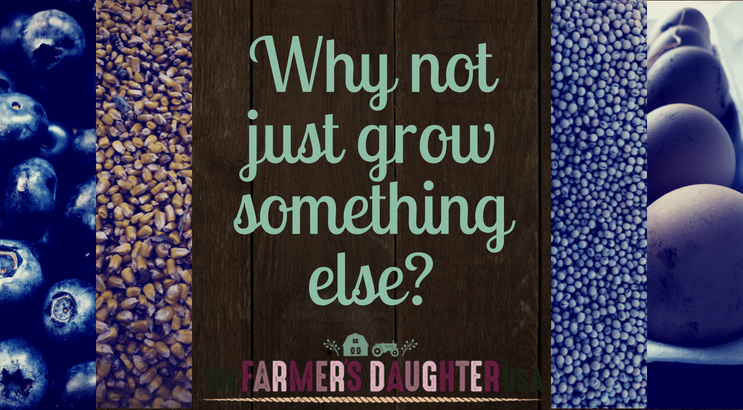
Low prices. High input costs. Labor shortages. Trade wars.
The farm economy faces a lot of challenges, especially as markets shift and change. Sometimes there is a shortage of a certain crop, sometimes something new becomes trendy (and with a premium price!), and sometimes there is oversupply. Yet, many times, farmers choose to continue growing and producing the same crops, regardless of market changes.
It begs the question: why don’t farmers just switch to another crop?
It is certainly a good question and one worth discussing. It is true that farmers can make changes to their production. For example, our own farm transitioned from growing a mixture of fruits and vegetables and soybeans and corn, to just growing corn and soybeans. When my youngest brother and I graduated from college and took off-farm jobs, our family farm was short on labor for the fruit and vegetables. For us, the change was relatively easy, but that isn’t always the case.
Here are a few barriers that prevent farmers from just changing production.
Market Access
Market access is probably one of the biggest barriers to changing the production of a farm. Sure, we could switch our operation over fairly easily to canola or oats. But, even if we did, we have nowhere near us to sell that crop. The granaries in our area are set up to accept corn and soybeans, and not much more. If dairy prices were high and we started producing milk, we would have to seek out someone that would accept it. It doesn’t matter the price of a certain commodity if you have nothing to do with it.
Labor
Many crops, including some animals, outside of grains are very labor intensive. Access to labor is a big problem for fruit and vegetables growers generally, but it is also a significant barrier to switching to different crops. While we could easily plant and grow vegetables and fruit, we would never find the labor necessary to harvest or care for those plants. Finding and recruiting workers isn’t nearly as easy as just putting an ad on Indeed or Craigslist. Imagine finding someone that has the working knowledge to jump into one of our big tractors and hit the ground running; that rarely just happens. If the labor, skilled or otherwise, isn’t available, there is no point in planting crops that will just die in the fields.
Soil
Sometimes the dirt itself prevents us from switching to other crops. Our soil is a bit sandier, so we have been able to grow a variety of things, including watermelon. But it isn’t ideal for other crops. Just as with the other things on this list, we can’t just pick up and move. The best thing for our farm is to growing crops that do well in the type of soil that we have, which does not necessarily line up with the current status of the market.
Climate
This one seems pretty obvious. We can’t just pick and move the farm; we’re stuck exactly where we are right now. That means we also have to take the weather we can get. By default, in Michigan, that rules out a number of crops – bananas, pineapple, mangoes, and papaya (just to name a few!). But the same is true in other parts of the country, too. Some don’t have long enough seasons to grow certain crops. Some regions have regular freezes late in the spring. Some weather conditions are too harsh for some plants. Again, we have to go with the weather we have.
Equipment
Some crops require certain equipment. For example, just to grow corn we have tractors, several types of tillage implements, a planter, a fertilizer applicator, a combine with corn head, grain wagons, a semi-truck and trailer, a grain bin, and an auger. I’m probably missing a couple things… The point is, some crops can require particular equipment. Farm equipment is expensive. To switch to a crop that needs that equipment results in a significant financial investment, even if one can rent all of the required equipment. It can definitely be a barrier to switching production.
Specialization
My family can talk all day long about soil health, but ask us about lowering the risk of mastasis in dairy cows and you’ll probably get a blank stare back. That’s because our farm “specializes” in growing corn and soybeans. We are constantly learning, progressing, developing, and working to do a better job at growing corn and soybeans. While we certainly have the room to switch to dairy, we don’t have the experience or knowledge that more seasoned dairy farmers possess. As you can imagine, lacking specialization can make it difficult to switch crops or production, especially when attempting to keep the farm competive against others with that specialization.
Of course, I’m not suggesting that it is impossible to tranistion the family farm into growing something different, but it can be hard for the reasons listed above. That is why, often, farm families decide to wait out difficult times instead of trying something new each season.



You should also mention, not every crop is cover by crop insurance in every area. And without crop insurance, a lender will not lend funds to grow that crop. A special written agreement with the crop insurance company allows little coverage’ there is not much encouragement to step out of the corn, soybean, wheat crop world.
Thanks for the article.
V Worden
Very good point, Vanessa!